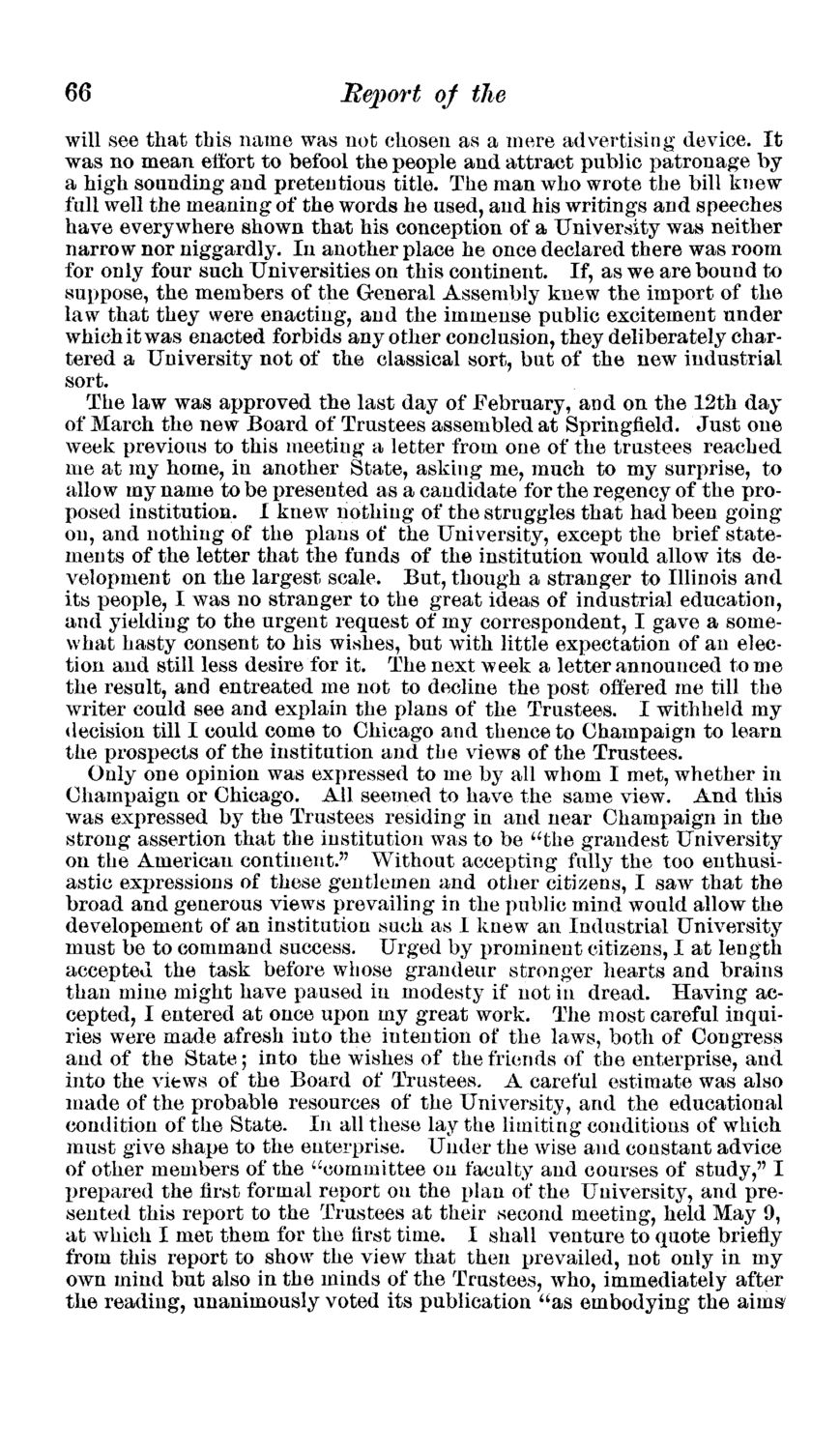| |
| |
Caption: Board of Trustees Minutes - 1874
This is a reduced-resolution page image for fast online browsing.

EXTRACTED TEXT FROM PAGE:
66 Heport of the will see that this name was not chosen as a mere advertising device. I t was no mean eiibrt to befool the people and attract public patronage by a high sounding and pretentious title. The man who wrote the bill knew full well the meaning of the words he used, and his writings and speeches have everywhere shown that his conception of a University was neither narrow nor niggardly. In another place he once declared there was room for only four such Universities on this continent. If, as we are bound to suppose, the members of the G-eneral Assembly knew the import of the law that they were enacting, and the immense public excitement under which it was enacted forbids any other conclusion, they deliberately chartered a University not of the classical sort, but of the new industrial sort. The law was approved the last day of February, and on the 12th day of March the new Board of Trustees assembled at Springfield. Just one week previous to this meeting a letter from one of the trustees reached me at my home, in another State, asking me, much to my surprise, to allow my name to be presented as a candidate for the regency of the proposed institution. I knew nothing of the struggles that had been going on, and nothing of the plans of the University, except the brief statements of the letter that the funds of the institution would allow its development on the largest scale. But, though a stranger to Illinois and its people, I was no stranger to the great ideas of industrial education, and yielding to the urgent request of my correspondent, I gave a somewhat hasty consent to his wishes, but with little expectation of an election and still less desire for it. The next week a letter announced tome the result, and entreated me not to decline the post offered me till the writer could see and explain the plans of the Trustees. I withheld my decision till I could come to Chicago and thence to Champaign to learn the prospects of the institution and tbe views of the Trustees. Only one opinion was expressed to me by all whom I met, whether in Champaign or Chicago. All seemed to have the same view. And this was expressed by the Trustees residing in and near Champaign in the strong assertion that the institution was to be "the grandest University on the American continent." Without accepting fully the too enthusiastic expressions of these gentlemen and other citizens, I saw that the broad and generous views prevailing in the public mind would allow the developement of an institution such as I knew an Industrial University must be to command success. Urged by prominent citizens, I at length accepted the task before whose grandeur stronger hearts and brains than mine might have paused in modesty if not in dread. Having accepted, I entered at once upon my great work. The most careful inquiries were made afresh into the intention of the laws, both of Congress and of the State; into the wishes of the friends of tbe enterprise, and into the views of the Board of Trustees. A careful estimate was also made of the probable resources of the University, and the educational condition of the State. In all these lay the limiting conditions of which must give shape to the enterprise. Under the wise and constant advice of other members of the "committee on faculty and courses of study," I X^repared the first formal report on the plan of the University, and presented this report to the Trustees at their second meeting, held May 9, at which I met them for the first time. I shall venture to quote briefly from this report to show the view that then prevailed, not only in my own mind but also in the minds of the Trustees, who, immediately after the reading, unanimously voted its publication "as embodying the aims'
| |